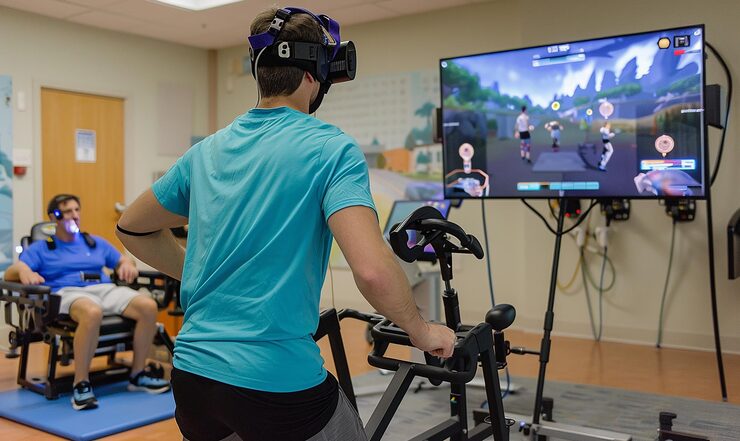Gaming Skill-Building Exercises are essential for competitive players who want to excel in esports and online tournaments. Just like traditional athletes, gamers must train their minds, reflexes, and strategic thinking to gain an edge over opponents. Incorporating structured exercises can dramatically improve hand-eye coordination, decision-making speed, and in-game awareness.
In a world where esports is gaining global recognition, consistent practice and targeted skill-building separate casual players from professional competitors. Many top players follow routines that balance gaming drills with mental conditioning and physical wellness. By understanding and applying Gaming Skill-Building Exercises, players can enhance performance while reducing the risk of burnout.
Improving Reflexes and Reaction Time
Reflexes are the backbone of competitive gaming. Exercises that focus on quick decision-making, precision, and reaction time are crucial for any serious player. For example, practicing aim drills in first-person shooters or reaction-based mini-games can improve accuracy under pressure.
Gamers often use specialized software that tracks response time and visual cues, providing feedback on progress. These exercises not only sharpen reflexes but also help players maintain calm during fast-paced matches, giving them an edge in tournaments and online competitions.
Enhancing Strategic Thinking and Game Sense
Strategy is equally important in competitive gaming. Developing a strong game sense—understanding the flow of the game, predicting opponent behavior, and optimizing resource usage—requires deliberate practice. Simulated scenarios and replay analysis can help players identify patterns, strengths, and weaknesses in both their own and competitors’ playstyles.
Team-based games especially benefit from exercises that encourage collaboration and tactical planning. By integrating Gaming Skill-Building Exercises focused on strategy, players can make more informed decisions, anticipate challenges, and adapt quickly during live matches.
Strengthening Hand-Eye Coordination
Precision in gaming relies heavily on hand-eye coordination. Simple exercises like tracking moving targets, rhythm-based challenges, and quick-click drills can improve accuracy and timing. Professional players often dedicate time to these micro-exercises daily to ensure consistency and fluidity in gameplay.
Maintaining ergonomic posture while practicing also plays a role in performance. Proper setup of keyboard, mouse, or controller, combined with exercises targeting coordination, helps prevent strain and allows players to perform at peak levels for extended periods.
Mental Conditioning and Focus
Competitive gaming demands intense concentration. Mental conditioning exercises, such as visualization, mindfulness, and short meditation sessions, can significantly improve focus and reduce stress during matches. Players who can maintain composure under pressure are more likely to make effective decisions in split-second scenarios.
Visualization exercises, where players mentally rehearse gameplay strategies and anticipate opponent moves, are a key part of many professional routines. These exercises, coupled with regular gaming practice, enhance situational awareness and decision-making speed, giving players a competitive advantage.
Teamwork and Communication Drills
For multiplayer competitive games, communication and teamwork are just as important as individual skill. Exercises that emphasize coordinated strategies, clear communication, and role assignment help teams perform efficiently. Practicing with scrimmages, in-game drills, and strategy sessions allows players to refine their synergy and anticipate each other’s moves.
Effective communication exercises also reduce misunderstandings and help teams adapt quickly during high-pressure situations. When combined with Gaming Skill-Building Exercises targeting reflexes and strategy, players become well-rounded competitors capable of thriving in team-based environments.
Tracking Progress and Analyzing Performance
Consistent assessment is crucial to skill-building. Recording gameplay sessions and analyzing mistakes or successful plays helps players understand their strengths and weaknesses. Many competitive players maintain a practice journal or use analytics tools to monitor improvements in reflexes, accuracy, and strategic decisions.
Regular evaluation ensures that exercises remain effective and tailored to the player’s needs. By continuously adapting training routines based on performance metrics, gamers can maximize growth and maintain an upward trajectory in skill development.
Balancing Physical Health with Gaming Practice
Physical well-being directly impacts gaming performance. Incorporating stretches, exercises for posture, and hand-strength routines prevents injuries and promotes endurance during long practice sessions. Healthy habits such as proper sleep, hydration, and nutrition also support cognitive function and reaction speed.
Competitive players often integrate light cardio, yoga, or strength training to maintain overall wellness. Balancing physical health with dedicated Gaming Skill-Building Exercises ensures sustainable performance and long-term success in the gaming arena.
Developing competitive gaming skills requires a combination of mental sharpness, reflex training, strategic thinking, and physical wellness. By systematically applying Gaming Skill-Building Exercises, players can elevate performance, enhance teamwork, and gain an edge in tournaments while enjoying a balanced and sustainable approach to competitive gaming.
Read also:
menu harga gacoan
burger king menu
cheesiest menu
rameshwaram cafe chennai
mehidy hasan miraz stats
arshin kulkarni stats
sahibzada farhan

